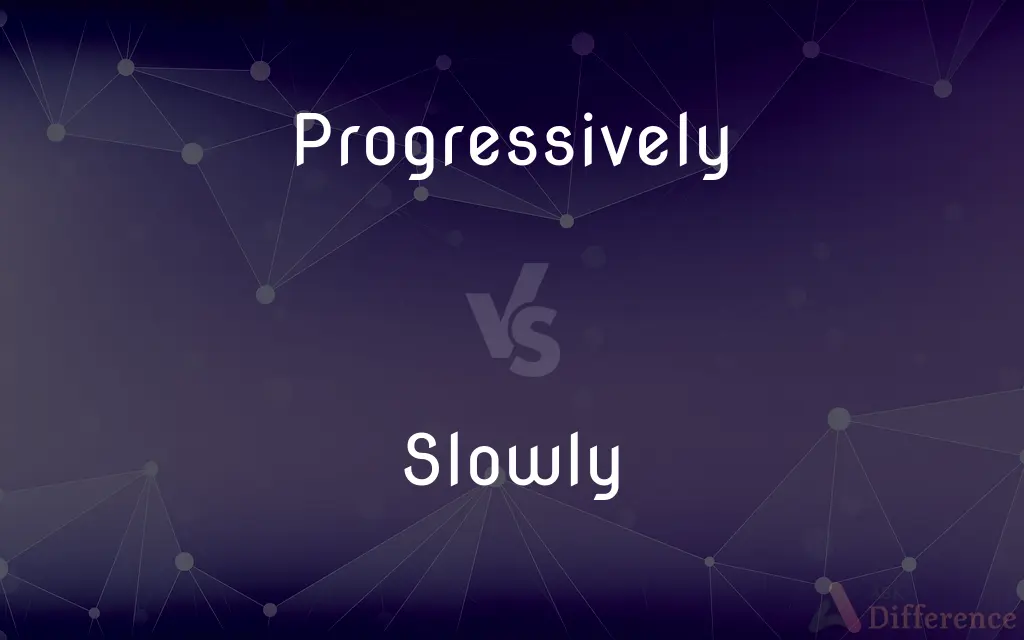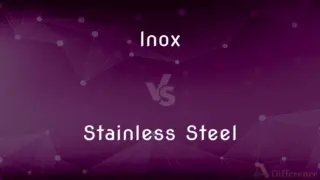Progressively vs. Slowly — What's the Difference?
By Tayyaba Rehman — Published on January 9, 2024
"Progressively" implies gradual improvement or increase over time, while "slowly" refers to a low speed or rate of action without implying progress.

Difference Between Progressively and Slowly
Table of Contents
ADVERTISEMENT
Key Differences
"Progressively" denotes a sequence of advancements or developments, often suggesting positive change or growth. In contrast, "slowly" describes the speed of an action, emphasizing a leisurely or delayed pace. While "progressively" focuses on the nature of change, "slowly" merely describes the rate at which something happens.
When something occurs progressively, it means there is a gradual and often systematic progression. This progression might be towards complexity, efficiency, or maturity. "Slowly," however, indicates that something is happening at a reduced speed, without necessarily any progression or advancement involved.
In the context of learning, "progressively" suggests a step-by-step improvement in understanding or skill. For instance, a student may grasp concepts progressively, building on previous knowledge. On the other hand, "slowly" in this context would mean the student is taking more time than usual to understand, without implying any progression in their learning curve.
In technology, being progressive might refer to software updating progressively, enhancing features and fixing bugs over time. Conversely, if a system runs slowly, it's operating at a reduced speed, but this doesn't indicate improvement or development.
"Progressively" often carries a positive connotation, as it implies moving forward or advancing. In comparison, "slowly" can be neutral or negative, depending on the context. It simply describes the tempo and can imply a lack of efficiency or urgency.
ADVERTISEMENT
Comparison Chart
Speed
Implies gradual increase
Implies a rate that is below average
Nature of Change
Suggests improvement or development
Does not imply change, only the rate of action
Connotation
Often positive, indicating advancement
Can be neutral or negative, indicating delay
Contextual Usage
Used when indicating step-by-step improvements
Used to describe the tempo of actions without progress
Implication
Suggests a process moving towards a goal or better state
Indicates a simple reduction in speed without end goals
Compare with Definitions
Progressively
Gradually advancing in stages
The patient's health improved progressively after the treatment.
Slowly
At a leisurely pace
He walked slowly through the park, enjoying the scenery.
Progressively
Increasing steadily by degrees
The software's capabilities expanded progressively with each update.
Slowly
With a delay or gradual manner
The sun slowly set behind the mountains.
Progressively
Moving forward or evolving over time
Her skills in painting developed progressively.
Slowly
Indicating a lack of speed
Traffic moved slowly due to the heavy rain.
Progressively
Proceeding in steps or phases
The construction project progressed progressively, with each phase building on the last.
Slowly
Not moving or able to move quickly; proceeding at a low speed
A slow train.
Slow walkers.
Progressively
Becoming more intense or severe
The storm grew progressively stronger by the hour.
Slowly
Marked by a retarded tempo
A slow waltz.
Progressively
Moving forward; advancing.
Slowly
Taking or requiring a long time
The slow job of making bread.
Progressively
Proceeding in steps; continuing steadily by increments
Progressive change.
Slowly
Taking more time than is usual
A slow worker.
Slow progress in the peace negotiations.
Progressively
Open to or favoring new ideas, policies, or methods
A progressive politician.
Progressive business leadership.
Slowly
Allowing movement or action only at a low speed
A slow track.
A slow infield.
Progressively
Progressive Of or relating to a Progressive Party
The Progressive platform of 1924.
Slowly
Registering a time or rate behind or below the correct one
A slow clock.
Progressively
Of or relating to progressive education
A progressive school.
Slowly
Lacking in promptness or willingness; not precipitate
They were slow to accept our invitation.
Progressively
Increasing in rate as the taxable amount increases
A progressive income tax.
Slowly
Characterized by a low volume of sales or transactions
Business was slow today.
Progressively
Tending to become more severe or wider in scope
Progressive paralysis.
Slowly
Lacking liveliness or interest; boring
A slow party.
Progressively
(Grammar) Designating a verb form that expresses an action or condition in progress.
Slowly
Not having or exhibiting intellectual or mental quickness
A slow learner.
Progressively
(Music) Of or being a style that emphasizes virtuoso technique, rhythmic and melodic complexity, and unconventional forms and instrumentation
Progressive rock.
Progressive jazz.
Slowly
Only moderately warm; low
A slow oven.
Progressively
A person who is open to or favors new ideas, policies, or methods, especially in politics.
Slowly
So as to fall behind the correct time or rate
The watch runs slow.
Progressively
Progressive A member or supporter of a Progressive Party.
Slowly
At a low speed
Go slow!.
Progressively
(Grammar) A progressive verb form.
Slowly
To make slow or slower.
Progressively
In a progressive manner.
Slowly
To delay; retard.
Progressively
As part of a progression.
Slowly
To become slow or slower.
Progressively
Advancing in amount or intensity;
She became increasingly depressed
Slowly
(manner) At a slow pace.
Slowly
In a slow manner; moderately; not rapidly; not early; not rashly; not readly; tardly.
Slowly
Without speed (`slow' is sometimes used informally for `slowly');
He spoke slowly
Go easy here--the road is slippery
Glaciers move tardily
Please go slow so I can see the sights
Slowly
In music;
Play this lento, please
Slowly
Without haste or rapidity
She slowly stirred the soup to blend the flavors.
Slowly
Methodically and carefully
He slowly assembled the intricate model airplane.
Common Curiosities
Is "progressively" always about speed?
No, it's more about gradual advancement than speed.
Are "progressively" and "slowly" opposites?
Not exactly. They describe different aspects - rate of change vs. speed.
Can "progressively" refer to worsening conditions?
Yes, it can describe something getting progressively worse.
Can "slowly" imply progress?
Not directly; it only describes the pace, not progression.
Does "slowly" always mean inefficiency?
No, sometimes doing things slowly is more effective or enjoyable.
Is "progressively" used only in positive contexts?
Mostly, but it can be used in neutral contexts, like describing a gradual process.
Can "slowly" be used positively?
Sometimes, especially when a careful, unhurried approach is beneficial.
Does "progressively" imply a final goal?
Often, it suggests moving towards a specific end state or improvement.
Can "slowly" be used in a technical context?
Yes, like describing the slow response time of a device.
Does "progressively" imply positive change?
Yes, it often suggests improvement or development.
Can something be both progressive and slow?
Yes, something can develop gradually (progressively) but at a slow pace.
Is "progressively" a modern term?
No, it's been in use for a long time, though its application may evolve.
Do "progressively" and "slowly" have the same grammatical use?
Both are adverbs, but they modify actions in different ways.
Is "slowly" subjective?
Yes, what is slow for one person might not be slow for another.
Can a situation change slowly but not progressively?
Yes, if there's no improvement or development, just a slow pace.
Share Your Discovery

Previous Comparison
Virtual Function vs. Pure Virtual Function
Next Comparison
Inox vs. Stainless SteelAuthor Spotlight
Written by
Tayyaba RehmanTayyaba Rehman is a distinguished writer, currently serving as a primary contributor to askdifference.com. As a researcher in semantics and etymology, Tayyaba's passion for the complexity of languages and their distinctions has found a perfect home on the platform. Tayyaba delves into the intricacies of language, distinguishing between commonly confused words and phrases, thereby providing clarity for readers worldwide.













































